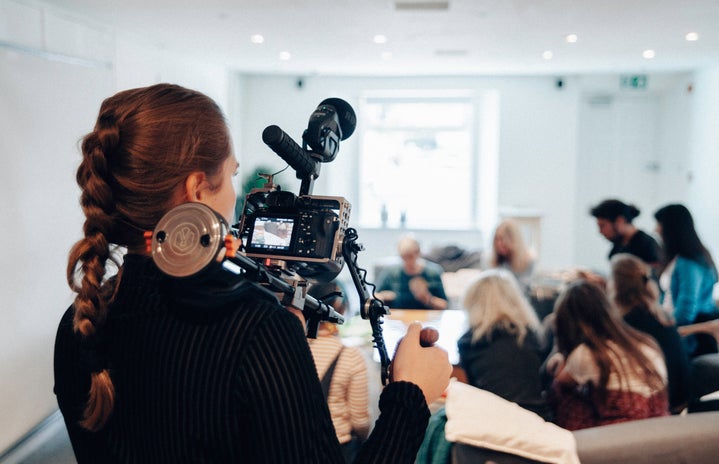I am currently a sophomore at the University of Connecticut, pursuing a bachelor of arts in journalism. When I first walked to the journalism department on the fourth floor of Oak Hall, now called Susan Herbst Hall, for my journalism first-year experience class, I had no idea if I would stay. Having no previous journalism experience from high school, I chose journalism simply because of my passion for writing and my love of Gilmore Girls. It wasn’t until I began taking my required journalism classes and writing at the Daily Campus, that I could fully see myself as a journalist and found my passion in reporting news. As I finish up my fourth semester, I am two years away from becoming a journalist in a world where the industry is rapidly changing and news is spreading at lightning speed. With a click of a button, people are getting news on their phones, and traditional media such as newspapers and radio stations are seeing steady declines. So how does a student journalist like myself prepare to enter a world of journalism that has never been seen before?
Here is my guide to being a journalism major, and my advice for anyone who is seeking to pursue a degree in journalism.
1. Join on-campus media organizations
I started writing for the news section of the Daily Campus during the first semester of my freshman year. It wasn’t until my second semester that I took my first news writing class. My news editors at the Daily Campus taught me how to write news stories, which are different from other forms of writing. When I got to my first news writing class, I had already written over 10 news stories and was able to further strengthen my writing skills, as opposed to learning how to write a lede for the first time. Now, I have over 50 published stories for the student-run newspaper, and am a copy editor, where I work on the production team to edit articles, ensuring that they adhere to AP Style guidelines. This has allowed me to not only advance my writing skills but also my interviewing, editing, and collaboration skills. UConn also has a student television station, UCTV, and a radio station, WHUS, where students are able to create work for their portfolios and advance their skill sets. Involvement in these media organizations looks strong on resumes and provides opportunities for students to produce published work for reels and portfolios.
2. Get used to talking to people
An essential component of journalism is interviewing, and the UConn Department of Journalism will prepare you for it. Classes will require you to conduct interviews for your stories about a variety of topics. Between my classes and Daily Campus work, I have at least one interview a week. It has allowed me to talk to faculty and students across the university, and people in the local community about important issues. These experiences are preparing me for a real career, and have allowed me to see what a future of reporting will really look like.
3. Form connections with your professors
The journalism professors at UConn all have various experiences in journalism, with some having worked in the TV, radio, and newspaper industries before becoming teachers. They have connections with organizations that could help you get internships or job opportunities. Class sizes are often no larger than 20 people, allowing professors to know your name, which is a strong advantage of a smaller major.
4. Projects, Projects, Projects
If you are not a good test taker, you are in luck. Most journalism classes have final essays and projects, rather than standard tests. It can make the week before finals very chaotic, but it makes the actual finals week less stressful. Since a lot of these projects require many steps, such as talking with other people, writing multiple drafts, and editing, it is important to plan your time wisely.
5. Explore your interests
The journalism major at UConn allows you to explore other interests, by giving you the time to major or minor in other fields. There is always the question: What do you want to write about? While some decide to pursue writing about politics and policymaking, others may prefer to write about science and health. This provides the opportunity for students to double major or minor in political science or a science-related field. Some obtain other skills in multi-media and go down a communications route. There are a plethora of paths that students can take in their undergraduate years to prepare themselves for future jobs in journalism.
In high school, many people asked me why I wanted to pursue a career in journalism, and I really couldn’t answer the question. After almost two years, I have now fully immersed myself as a student journalist. Journalism has its unique challenges, as classes are starkly different from other majors. At first, I was scared to commit to a career that may not have the highest pay rates and have long, tiring hours, but now I am excited to take what I have learned and make a difference in the real world. I also am not done learning, as I still have two years left to complete my degree. No matter what journalism looks like in the future, I believe people will always read the news and I hope to be a journalist where I can tell people’s stories and inform others about important issues.




